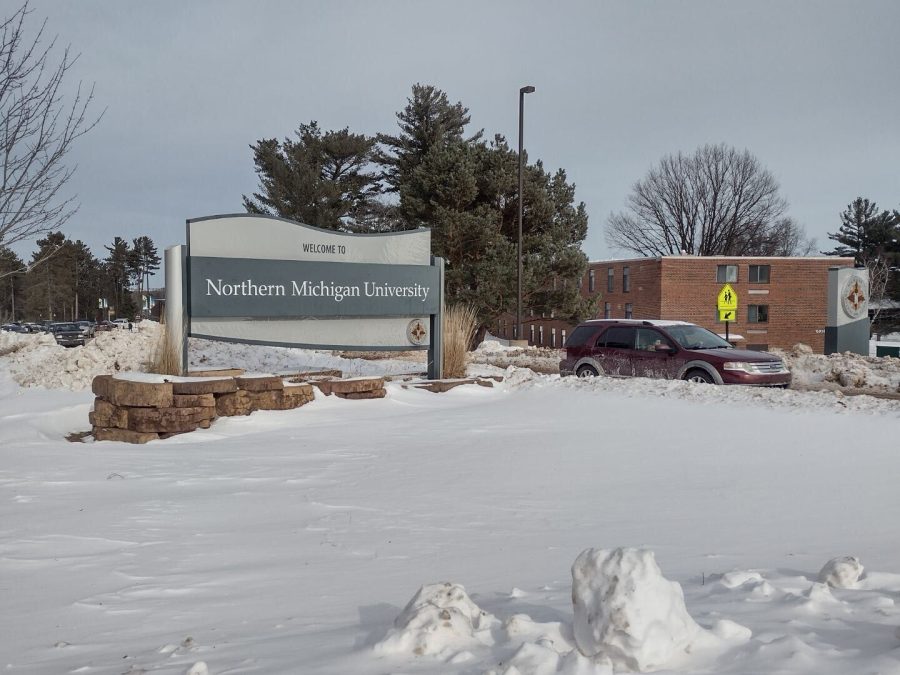COVID on campus: how NMU is handling the omicron variant
January 27, 2022
Northern Michigan University’s Winter 2022 semester began two days late and did not hold in-person classes until the following week. This was in large part due to the rising cases of COVID with the omicron variant and NMU’s attempt to have everyone be secured with the proper KN95 or N95 masks.
Due to how quickly the omicron variant spreads, NMU COVID-19 task force co-chairs Mike Bath, chief of police and director of safety, and Cindy Paavola, assistant to the president for strategic initiatives, said that the number of cases for the winter semester was expected.
“Once omicron began spreading in the United States it was known that omicron cases would hit college and university campuses, especially since it is such a highly contagious variant,” the NMU COVID-19 task force said. “Northern went into the Winter semester knowing that we would have more positive COVID cases due to omicron in Winter 2022 than we had in Fall 2021 — before the spread of omicron. Even with the increase of omicron cases, our positivity rate is considered quite low (under 3%).”
As of Jan. 26, NMU’s Safe on Campus Dashboard reports 11 active cases with the total amount of cases for the semester so far being 149. That total exceeds Fall 2021 semester by 12.
Despite the surge in cases, NMU still remains committed to in-person classes until it becomes unsafe to due so. While Plexiglas and social distancing in classrooms are not as strict as they were previous semesters, this is because of how widely accessible the vaccine is.
“Stricter mandates were in place at the beginning of the COVID pandemic because vaccinations (and now boosters) were not available at that time,” NMU COVID-19 task force said. “They are now widely available and while fully vaccinated and boosted individuals can still get COVID, they are at decreased risk and they tend to not get as sick as those who have not vaccinated and received booster shots.”
Currently, NMU employees hold the highest vaccination rate at a 96.8% with residence hall rates being 69.1% and students rate being 73.4%.
Though in-person learning remains open, some students still need to stay online for various reasons. Whether it be health, learning preference or simply unable to come to campus at this time, during mid-summer, however, NMU has returned to the former online processes and procedures.
According to the NMU COVID-19 task force, NMU committed to returning as fully in person as safely possible for the academic year when fees were set mid-summer.
“After vaccinations became available and with the CDC changing the isolation/quarantine requirement from 10 days to 5 days, Northern is not requiring faculty to do double duty by providing remote options in addition to their in-person format for their classes, although some instructors are doing so on their own.” the NMU COVID-19 task force said.
While the online fee is currently supporting all of the infrastructure needs it was put in place to support, students who are under the medically high risk category are directed to consult with Disability Services about alternative learning. High-risk faculty and staff are directed to Human Resources.
The most effective COVID mitigation measures are the easiest to do and are directly in control of students, faculty and staff, the NMU COVID-19 task force said. Wearing masks properly, washing hands regularly, staying home if experiencing COVID symptoms or not feeling well, getting tested and learning about vaccination and booster options are all ways to help keep cases down.
For more information regarding vaccination and booster options, the COVID-19 task force directs everyone to the NMU Health Center to set up an appointment for either a general appointment or in regards to getting the vaccine. The mental wellness services have also been increased according to the task force in hopes of students using them to manage pandemic burdens.
“Northern is committed to in-person learning unless it becomes unsafe,” the NMU COVID-19 task force said. “While a remote pause, such as what we took in the first week of the winter semester, might happen again if case numbers surge, going fully remote for the semester is highly unlikely.”



























